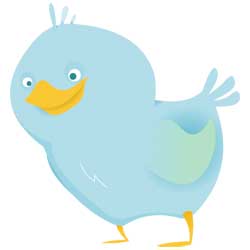As much as I’d love magic to exist in our ‘real’ universe, I have long ago filed it away with so many other things I wish were true. Sorry, Harry Potter. But a recent exchange on twitter has opened my eyes to the fact that there are other universes where magic might truly exist. One such is the twitterverse.
Now the twitterverse has its own fundamental laws and particles, tweets and RT’s, links and follower bots. They interact in strange and mysterious ways, which our social media physicists are still trying to put into a grand unified theory. But at this point in the development of the twitterverse, I think we see things as being caused by forces we don’t understand (magic), perhaps we are at the beginning of an alchemical approach to it. So for now, we can just act like things operate here by magic, until somebody has an apple fall on their head and begins to really understand this stuff.
My thoughts on this started when I was telling a friend on twitter how I had tweeted the name of a certain brand of coffee and I was immediately followed by a bot from that company. I was then contacted and I started getting free samples. She sounded skeptical.
But shortly thereafter she tweeted that it was working and that she was being followed by friendly bots.
So wishes can come true in the twitterverse. I’m not sure if you have to tap your heels, though. And not sure if the ‘Only three wishes’ rule applies here.





 Posted by booksbelow
Posted by booksbelow  We’re all on the same Twitter feed, aren’t we? No, actually we each have our own customized feeds of those we choose to follow and I think we don’t realize how much these can differ. So is there really any such thing as a universal Twitter expert, guru, coach? Is there an Emily Post on Twitter that covers everyone? I don’t think so. You need to find and follow the people relevant to your particular community or communities. There are many different communities on twitter, and like communities anywhere they differ in customs and manners. Some people just endlessly tweet what they do all day, as so many people wrongly perceive Twitter is all about. Communities of online merchants see nothing wrong with talking about and promoting their offerings, public relations and marketing people see nothing wrong with endless self-examination of the effects of social medias on their fields. Charity fundraisers see nothing wrong with their endless appeals. Geeks chatter endlessly about the latest apps and gadgets, musicians connect and promote, writers network and chat. The list goes on and on.
We’re all on the same Twitter feed, aren’t we? No, actually we each have our own customized feeds of those we choose to follow and I think we don’t realize how much these can differ. So is there really any such thing as a universal Twitter expert, guru, coach? Is there an Emily Post on Twitter that covers everyone? I don’t think so. You need to find and follow the people relevant to your particular community or communities. There are many different communities on twitter, and like communities anywhere they differ in customs and manners. Some people just endlessly tweet what they do all day, as so many people wrongly perceive Twitter is all about. Communities of online merchants see nothing wrong with talking about and promoting their offerings, public relations and marketing people see nothing wrong with endless self-examination of the effects of social medias on their fields. Charity fundraisers see nothing wrong with their endless appeals. Geeks chatter endlessly about the latest apps and gadgets, musicians connect and promote, writers network and chat. The list goes on and on. Some of the more well-known Twitter ‘personalities’ cross over many of these Twitterverses, but I’ve noticed lately a slightly schizophrenic tendency in their tweets and blogs as they try be universal to an increasingly diverse following. You can’t be all things to all people, as they say. And one set of rules of behavior won’t fit very different communities on Twitter. The way people use Twitter is their own affair, and shouldn’t be crammed down other’s throats like ‘the one true religion.’
Some of the more well-known Twitter ‘personalities’ cross over many of these Twitterverses, but I’ve noticed lately a slightly schizophrenic tendency in their tweets and blogs as they try be universal to an increasingly diverse following. You can’t be all things to all people, as they say. And one set of rules of behavior won’t fit very different communities on Twitter. The way people use Twitter is their own affair, and shouldn’t be crammed down other’s throats like ‘the one true religion.’

 I list on several different book sites. If something happens to any one of them, it doesn’t tip the balance of my survival as a bookseller. Except one, Amazon. As time passes, the percentage of sales generated by Amazon increases, right now for me it’s somewhere around 75%. They are very successful at what they do, getting their name out there, and when people think book nowadays, they think Amazon. Now Amazon is a private profit-making company, and in general I support their right to do pretty much whatever they want. But what social responsibility does such a company have to people who make their living selling through them?
I list on several different book sites. If something happens to any one of them, it doesn’t tip the balance of my survival as a bookseller. Except one, Amazon. As time passes, the percentage of sales generated by Amazon increases, right now for me it’s somewhere around 75%. They are very successful at what they do, getting their name out there, and when people think book nowadays, they think Amazon. Now Amazon is a private profit-making company, and in general I support their right to do pretty much whatever they want. But what social responsibility does such a company have to people who make their living selling through them?
